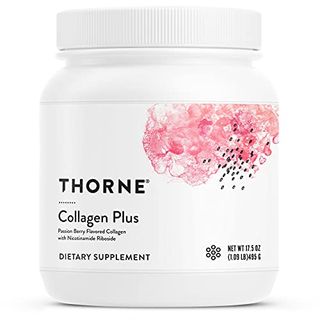A Derm, Doctor, and Dietitian Agree: Collagen Supplements *Actually* Work

In the beauty industry, the word collagen is synonymous with youth. We associate it with plump, smooth skin and strong, healthy hair. And we're not wrong. Collagen is a structural protein that supports our hair, skin, and nails. When you take it away, the skin becomes lax, and wrinkles appear. The hair becomes brittle and thin, and breakage increases. The nails become brittle, and peeling and splitting become more prevalent. You get the picture.
Unfortunately, natural collagen production decreases with age. It's no wonder why people turn to collagen supplements to boost their body's supply. If a supplement promises to treat and prevent visible signs of aging, why not take it? It sounds pretty good, right? As is often the case with these things, there's a catch. People are unsure whether collagen supplements actually work. Some sources claim they do; others aren't even slightly convinced. What's the consensus? We decided to find out once and for all, asking three experts—a dermatologist, doctor, and dietitian—if and how collagen benefits the hair and skin. Ahead, see their honest, science-backed answers.

What Is Collagen, and What Role Does It Play in the Body?
Elizabeth Sharp, MD, IFMCP, is the medical director and CEO of Health Meets Wellness. She says collagen goes far beyond hair and skin. It's a vital component of connective tissue. "It constitutes about 30% of the protein in your body and is integral to the structure and strength of connective tissues," she says. "This includes skin, muscles, tendons, ligaments, and bones. Essentially, collagen helps maintain the structural integrity of these tissues, providing elasticity and firmness."
While most of us think of collagen as one molecule or ingredient, Sharp says it's more of a category. What we call collagen encompasses 28 different types, and there are five main types found in the human body, those being types I, II, III, IV, and V. Even though they vary in type, Courtney Pelitera—MS, RDN, CNSC, certified registered dietitian of Top Nutrition Coaching—says they're made up of the same three amino acids: glycine, proline, and arginine.
As collagen decreases over time, Sharp says you may notice certain signs and symptoms. These include muscle weakness, decreased muscle mass, discomfort and aches, joint pain, and decreased mobility due to cartilage loss.
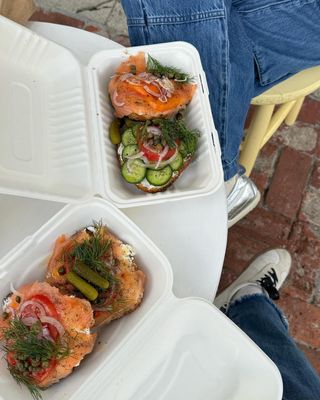
Lucky for us, we can incorporate more naturally collagen-rich foods into our diets to slow this process. Take it from Pelitera: "Collagen occurs naturally in animal proteins and fish products. Some of the foods highest in collagen include beef or pork bone broth, chicken with the skin intact, sardines, salmon, and organ meats—think liver, kidney, brain." Vegetarians and vegans, don't despair. There are plant sources too. "Plant sources of one of our three specific amino acids (glycine, proline, and arginine) will help the body to support natural production of collagen. Additionally, vitamin C plays a major role in collagen production, so foods like citrus fruits, strawberries, and bell peppers, which contain vitamin C, will also aid in natural collagen production," she says.
It's also worth checking in on your daily protein intake as a whole. "Meeting protein needs on a daily basis is going to be the best supplement for nails and skin," Pelitera says. "Remember, collagen is simply a different type of protein produced by the body, but incorporating 20 to 30 grams of protein with each meal will also ensure that your needs for all amino acids are met, supporting natural collagen production."

What Role Does Collagen Play in Hair and Skin?
Geeta Yadav, MD, is a board-certified dermatologist and the founder of Facet Dermatology in Ontario, Canada. She says that collagen is critical for both hair and skin. "[It] contributes to the formation of keratin, the primary protein in hair and nails. It's made up of the amino acids glycine and proline," she says. "Collagen is responsible for the strength, resilience, and elasticity of your hair, skin, and nails. In skin, in particular, it's what makes it look plump, firm, and bouncy." No surprise here!
Sharp agrees, saying it gives skin, hair, and nails strength and resilience. "It is crucial in reducing the appearance of fine lines and wrinkles by supporting skin structure and improving moisture levels. Additionally, collagen aids in wound healing and the regeneration of new skin cells, assisting in replacing dead or damaged cells," she says.
Unfortunately, the body's natural collagen production decreases pretty spectacularly with age. "There is evidence that shows collagen production decreases at about 1.5% a year, starting at early adulthood," Yadav says. "Skin collagen declines as much as 30% in the first five years of menopause." Sure, it's alarming, but it's part of the natural aging process.
Luckily, other factors affect collagen degradation, meaning we have some control over the situation depending on our daily habits and lifestyle choices. "Extrinsic factors like smoking, unprotected sun exposure, poor diet, etc. can all play a role in collagen degradation," Yadav says.
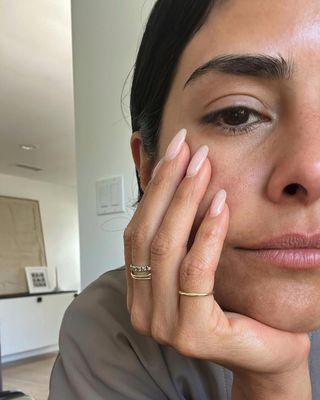
Can Collagen Supplements *Really* Improve Hair and Skin?
The doctor: "There is insufficient evidence from randomized control trials to suggest that oral collagen supplements can actually improve your collagen, but some studies do suggest the potential for aesthetic benefits, decreased wrinkles, and improved skin hydration. … When you consume collagen supplements, the protein is broken down into amino acids and peptides during digestion. These are then distributed throughout the body based on need, which means they may not specifically target the skin or hair but rather be utilized for essential functions like wound healing or muscle maintenance." — Sharp
The dermatologist: "Studies are limited at this time regarding the efficacy of hydrolyzed collagen supplements. It's also not clear if collagen supplements are specifically any better than protein supplements in general, which contain the same amino acids and others that are required for other structural proteins like muscle. There is some evidence that they can show promise in supporting skin elasticity, particularly marine and vegan collagen, but we really need larger-scale studies and trials to be performed to get a true sense of what is possible." — Yadav
The dietitian: "According to the research we have, collagen supplementation, particularly for hydrolyzed collagen, is very promising when looking at skin elasticity and skin hydration. There have even been some promising studies on skin wound healing and collagen supplementation." — Pelitera
There you have it. While scientific studies are limited, the experts agree that collagen supplements may improve the health of hair, skin, and nails.

Still, all three experts say they recommend incorporating collagen-rich foods into one's diet before reaching for a supplement. "For optimal collagen production, it's best to obtain the necessary building blocks through your diet, specifically foods with the amino acids needed to produce collagen—glycine and proline," Sharp says. "Foods rich in amino acids like glycine and proline—such as leafy greens, asparagus, mushrooms, eggs, dairy, fish, and red meat—are beneficial. Additionally, micronutrients like vitamin C (found in citrus fruits), copper (in nuts and dark chocolate), and zinc (in whole grains and leafy greens) play crucial roles in collagen synthesis."
What Should I Look for in a Collagen Supplement?
Don't grab any old collagen supplements you see. The experts agree that research is necessary. First, consider any dietary restrictions you may have. This goes for vegans and vegetarians specifically, as many collagen supplements are animal derived. "It's important to consider your collagen source when shopping for a collagen supplement," Yadav says. "In addition to possible allergies, you may have dietary restrictions that could conflict with some collagen supplements. For example, bovine collagen and porcine collagen are common."
Then, you should consider the brand/company behind the collagen supplement. "Production of the products is largely unregulated," Sharp says. "[It] could contain other products or 'fillers.' Make sure your supplements are tested for safety, quality, quantity, dosing, and toxins. I recommend ensuring that they're third-party tested."
Pelitera agrees. "With any nutritional supplement, I only recommend supplements that have been third-party tested," she says. "This is to ensure that the product contains all the ingredients and benefits that you are paying for."
Finally, Pelitera recommends looking for a supplement that goes easy on additives. "For example, some of the collagen coffee creamers have a whole list of different ingredients. I recommend skipping something like that and taking a more straightforward supplement with fewer additives," she says.

What Are Some Other Ways to Boost Collagen?
Aside from eating collagen-rich foods on the daily, the experts have some suggestions for naturally boosting collagen levels. For Yadav, it comes down to one thing: sunscreen. "Wear sunscreen! This is the easiest way to prevent collagen degradation and to keep your skin youthful and resilient for many years to come, but not enough people actually take the time to apply it daily. Those who do rarely reapply as often as they are supposed to for adequate protection," she says. In fact, she says sunscreen is the best preventative measure out there, and collagen supplements and in-office procedures can't compare.
Sharp agrees. She says to limit sun exposure, wear sunscreen, avoid smoking and vaping, and eat a protein-rich diet with vitamin C. Yep, it's true. Those healthy habits really are the best treatment for strong hair, skin, and nails.
Shop Collagen Supplements
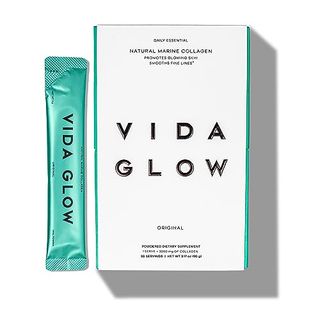
These individual marine collagen sachets are perfect for taking on the go.
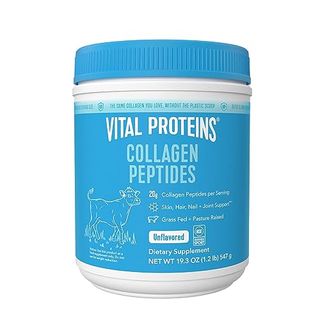
Vital Proteins makes one of the most recognizable collagen supplements on the market.
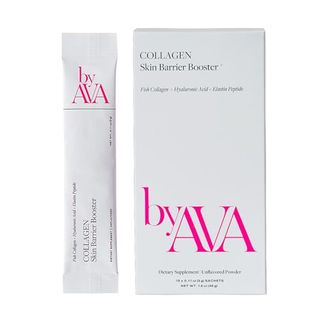
This is a marine collagen powder with hyaluronic acid, biotin, and vitamin C.
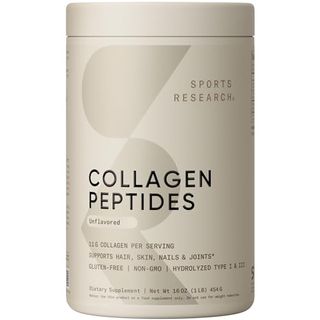
Sports Research's Collagen Peptides supplement contains hydrolyzed collagen in types I and III.
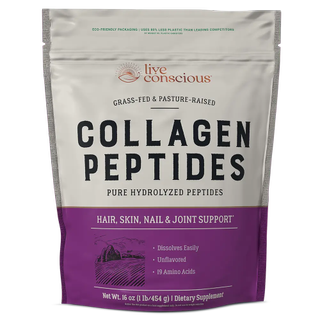
Multiple members of the Who What Wear beauty team swear by this one.
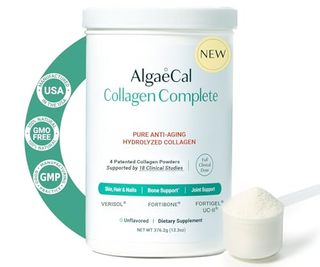
Another clinically studied bovine collagen to improve hair, skin, and nails.
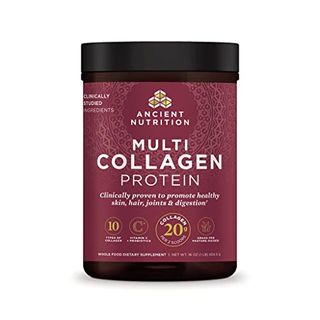
We love that this collagen powder contains probiotics for good gut health.
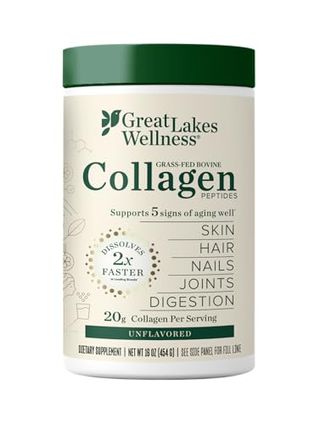
This collagen powder is hydrolyzed (which means it has been broken down into smaller, more usable components), non-GMO, keto, and kosher.
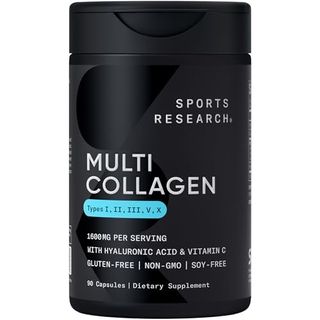
Another Sports Research formula, this one contains collagen types I, II, III, V, and X. There's also hyaluronic acid and vitamin C for added benefits.

Kaitlyn McLintock is a Beauty Editor at Who What Wear. Although she covers a wide range of topics across a variety of categories, she specializes in celebrity interviews and skincare and wellness content. Having lived in Los Angeles, California, and Austin, Texas, she has since relocated to her home state of Michigan. Before Who What Wear, she freelanced for a variety of industry-leading publications, including Byrdie, InStyle, The Zoe Report, Bustle, and more. When she's not writing, researching, or testing the latest and greatest beauty products, she's working through an ever-growing book collection, swimming in the Great Lakes, or spending time with family.
-
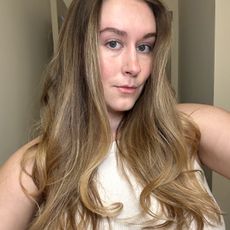 I Tried Amazon's #1 Hair Mask—Now I'm Pretty Sure I Could Audition for Hair Commercials
I Tried Amazon's #1 Hair Mask—Now I'm Pretty Sure I Could Audition for Hair CommercialsDo I need an agent?
By Kaitlyn McLintock
-
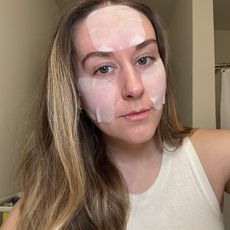 Hot Take—I Prefer This Korean Skincare Staple Over Viral Sheet Masks for Instantly Glowy Skin
Hot Take—I Prefer This Korean Skincare Staple Over Viral Sheet Masks for Instantly Glowy SkinFresh, glowing skin is ahead.
By Kaitlyn McLintock
-
 This Colorist Specializes in "No-Makeup Makeup" for Your Hair, so I Booked an Appointment
This Colorist Specializes in "No-Makeup Makeup" for Your Hair, so I Booked an AppointmentThis low-key technique makes a difference.
By Jamie Schneider
-
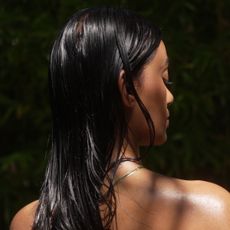 According to the Internet, Everyone's Using Drugstore Shampoo in 2025—9 Editor-Approved Formulas
According to the Internet, Everyone's Using Drugstore Shampoo in 2025—9 Editor-Approved FormulasExpensive-looking hair for an affordable price tag.
By Kaitlyn McLintock
-
 An Auric Aesthetician Gave Me an Energetic Beauty Prescription—These 12 Things Are Now Nonnegotiables
An Auric Aesthetician Gave Me an Energetic Beauty Prescription—These 12 Things Are Now NonnegotiablesBringing all the woo-woo energy into my beauty routine.
By Shawna Hudson
-
 When We're Busy AF, These "Slow Living" Beauty Routines Help Us Find Our Chill
When We're Busy AF, These "Slow Living" Beauty Routines Help Us Find Our ChillMore cozy vibes, please.
By Maya Thomas
-
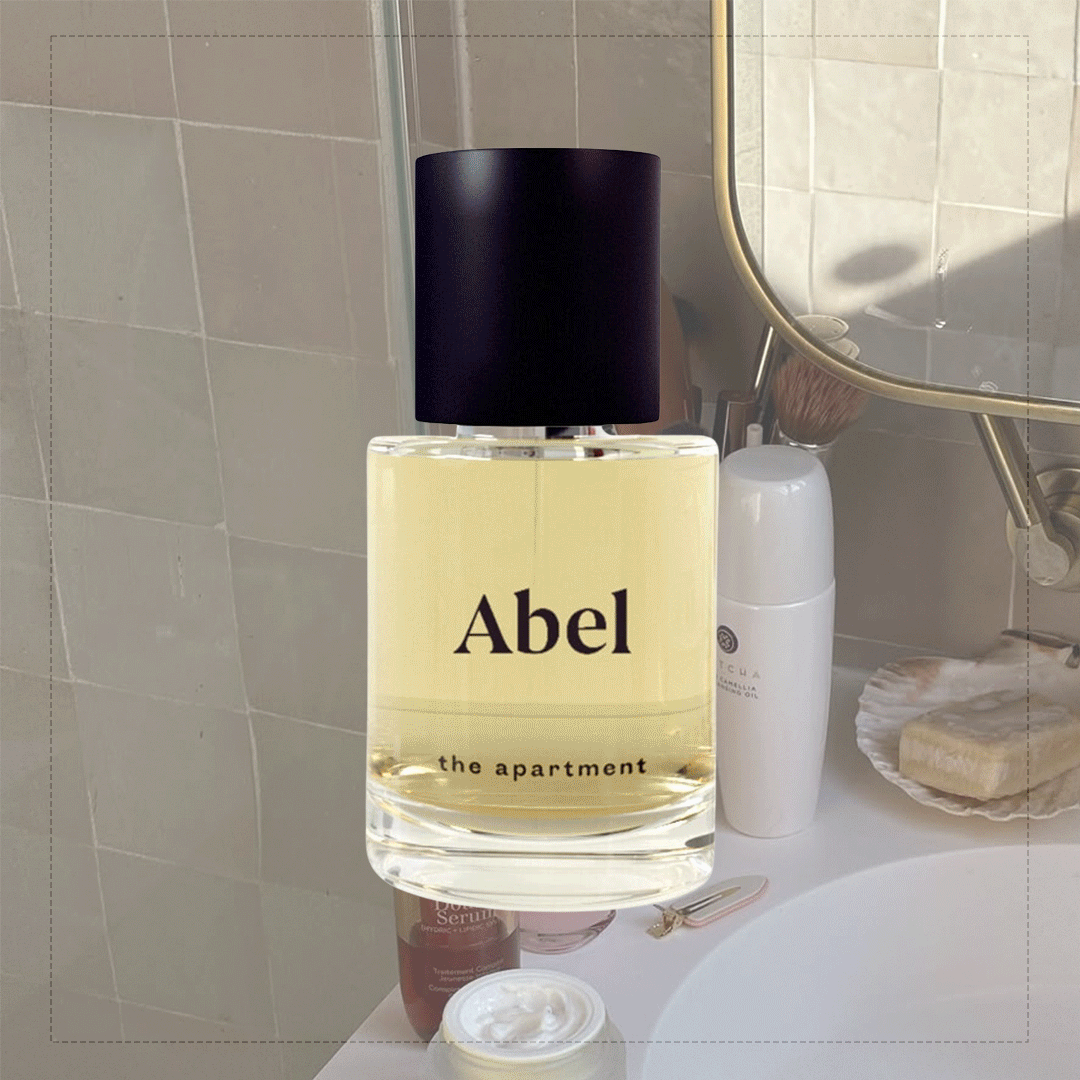 I'm Giving My Beauty Cabinet a Clean Sweep for 2025: Everything I'm Keeping and Replacing
I'm Giving My Beauty Cabinet a Clean Sweep for 2025: Everything I'm Keeping and ReplacingHere's to a fresh start.
By Maya Thomas
-
 I Won't Gatekeep—This Soon-to-Be-Viral Moisturizer Is My Secret to Buttery Skin This Winter
I Won't Gatekeep—This Soon-to-Be-Viral Moisturizer Is My Secret to Buttery Skin This WinterI'm literally scraping the sides of the jar.
By Jamie Schneider
